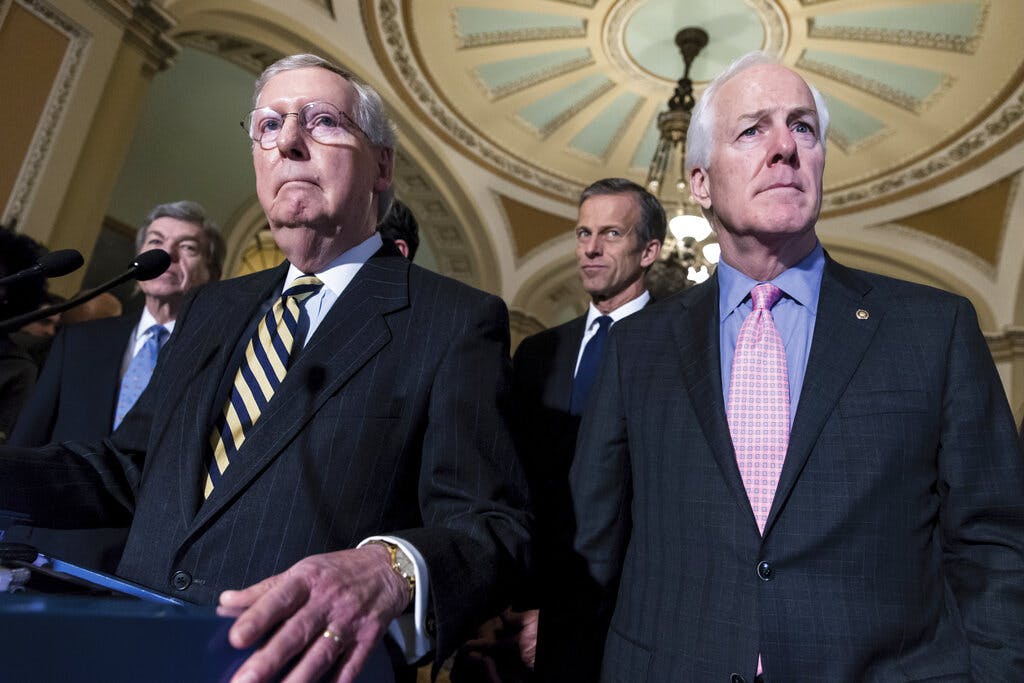Bipartisan Senate Group Wrangles Votes for Deal on Gun Safety
‘We are not talking about restricting the rights of current, law-abiding gun owners or citizens,’ Senator Cornyn said.

Senator Murphy is saying the outline for a bipartisan congressional deal on gun safety is expected to be reached by the end of this week. The Democrat of Connecticut said during an interview with CNN that the agreement will include investments in mental health and school security as well as legal changes that will allow states to more easily pass so-called red-flag laws.
The biggest hurdle for advocates of the legislation is the Senate filibuster; to bypass it would require 10 Republicans to support the legislation along with every Democrat in the chamber.
Senator Cornyn, who is leading the Republicans in the negotiations, has set to work wrangling members of his divided caucus to support a bill to reduce gun violence. The main sticking point is a measure that would help states expand red-flag laws, a policy endorsed by some Republicans and decried by others.
Previous attempts at passing bipartisan gun legislation, including 2013’s Manchin-Toomey bill to expand background checks and 2016’s bill to prevent terrorism suspects from purchasing firearms, have failed due to an inability to reach the 60-vote threshold in the Senate.
Mr. Murphy believes this round of negotiations is different. “There are more Republicans at the table talking about changing our gun laws and investing in mental health than at any time since Sandy Hook,” he told CNN, referring to the 2012 school massacre in Connecticut.
Senator McConnell, the minority leader, has also stated his support for the negotiations. However, he added a caveat by emphasizing a narrow focus on “a solution that’s directly related to the facts of this awful massacre,” referring to the school shooting at Uvalde, Texas, which left 19 children dead.
Initial talks considered the possibility of expanded background checks for gun purchases. Mr. Cornyn, though, said on Monday during a speech on the Senate floor that this was a nonstarter.
“We are not talking about restricting the rights of current, law-abiding gun owners or citizens,” Mr. Cornyn said. “What I’m interested in is keeping guns out of the hands of those who, by current law, are not supposed to have them.”
According to a statement from his spokesman, Mr. Cornyn refuses to entertain the introduction of a mandatory waiting period for gun purchasers who are between ages 18 and 21, NBC reports.
Mr. Cornyn also squashed the possibility of the Senate adopting any of the measures taken up by Democrats in the House of Representatives, where legislation is set to pass Wednesday that seeks to raise the minimum age to purchase an automatic rifle to 21 from 18; ban high-capacity magazines; and further regulate the storage of guns on residential premises, according to CBS.
A prospective Senate deal would be comparatively modest. Its most significant change surrounding guns would allow for the expansion of Extreme Risk Protection Orders — more colloquially known as red-flag laws.
These laws, which are on the books in 19 states, allow law enforcement and loved ones to file requests with judges for police to take firearms away from individuals for set periods of time if they are deemed to be a risk to themselves or others.
The bipartisan group of senators is unlikely to mandate such laws nationwide, but has discussed providing states with additional resources to enact their own versions, Politico reports.
The idea of expanding the laws has drawn criticism from some Republicans.
Representative Matt Gaetz last week said in a House Judiciary Committee hearing that any Republican who’d vote in favor of red flag laws would “betray their voters” and be “a traitor to the Constitution, the Second Amendment, [and] the Fifth Amendment.”
Representative Steve Scalise, the House’s Republican whip, likewise called such laws “unconstitutional,” in an interview on Fox News.
Mr. Cornyn, however, is “optimistic,” that he can rally 10 Senate Republicans to reach a deal, though he has said a bill should not be expected until next week.
“We have to be realistic about what can pass both chambers of Congress and get the president’s signature,” he said.
A congressional correspondent at CNN, Manu Raju, has reported that Mr. Cornyn’s presentation of plans for the bill to Republican colleagues provoked “chin scratching,” in Mr. Cornyn’s words — neither “pushback” nor a “standing ovation.”
According to Politico, At least four other Republicans — Senators Toomey, Collins, Cassidy, and Graham — have been directly involved in bipartisan talks.
Others not directly involved have publicly expressed support for some of the bill’s measures. Senator Rubio has said he supports making it easier for states to pass red flag laws — even introducing a bill to do so last year — but bristles at expanding background checks. Senator Portman expressed support for red flag laws in an emotional speech following May’s mass shooting at Buffalo.
According to PBS, which asked every American senator for their views on gun legislation in the wake of Uvalde, Senators Blunt and Romney have also made statements in support of red flag laws.
Other proposals in the conversation for a bipartisan bill to expand school security and bolster mental health funding for schools are more broadly supported within the Republican caucus.
Mr. Murphy said he does not expect a fully realized bill by the end of the week, but does envision finalizing an “outline” of what it will contain.

